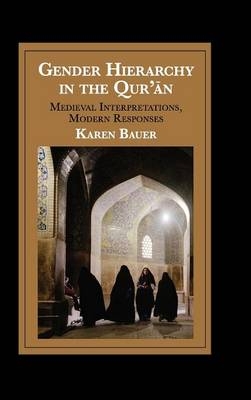
Gender Hierarchy in the Qur'an
Medieval Interpretations, Modern Responses
Seiten
2015
Cambridge University Press (Verlag)
978-1-107-04152-3 (ISBN)
Cambridge University Press (Verlag)
978-1-107-04152-3 (ISBN)
This book explores Muslim interpretations of Qur'ānic verses on gender roles in testimony, human creation and marriage. Karen Bauer traces the evolution of these interpretations, showing how they have been adopted, adapted, rejected or replaced over time, by comparing the Qur'ān with a wide range of Qur'ānic commentaries and interviews.
This book explores how medieval and modern Muslim religious scholars ('ulamā') interpret gender roles in Qur'ānic verses on legal testimony, marriage, and human creation. Citing these verses, medieval scholars developed increasingly complex laws and interpretations upholding a male-dominated gender hierarchy; aspects of their interpretations influence religious norms and state laws in Muslim-majority countries today, yet other aspects have been discarded entirely. Karen Bauer traces the evolution of their interpretations, showing how they have been adopted, adapted, rejected, or replaced over time, by comparing the Qur'ān with a wide range of Qur'ānic commentaries and interviews with prominent religious scholars from Iran and Syria. At times, tradition is modified in unexpected ways: learned women argue against gender equality, or Grand Ayatollahs reject sayings of the Prophet, citing science instead. This innovative and engaging study highlights the effects of social and intellectual contexts on the formation of tradition, and on modern responses to it.
This book explores how medieval and modern Muslim religious scholars ('ulamā') interpret gender roles in Qur'ānic verses on legal testimony, marriage, and human creation. Citing these verses, medieval scholars developed increasingly complex laws and interpretations upholding a male-dominated gender hierarchy; aspects of their interpretations influence religious norms and state laws in Muslim-majority countries today, yet other aspects have been discarded entirely. Karen Bauer traces the evolution of their interpretations, showing how they have been adopted, adapted, rejected, or replaced over time, by comparing the Qur'ān with a wide range of Qur'ānic commentaries and interviews with prominent religious scholars from Iran and Syria. At times, tradition is modified in unexpected ways: learned women argue against gender equality, or Grand Ayatollahs reject sayings of the Prophet, citing science instead. This innovative and engaging study highlights the effects of social and intellectual contexts on the formation of tradition, and on modern responses to it.
Karen Bauer is a Research Associate in Qur'ānic Studies at the Institute of Ismaili Studies in London. Her publications include articles on the Qur'ān, the genre of tafsīr and gender, as well as an edited volume entitled Aims, Methods and Contexts of Qur'anic Exegesis (2nd/8th–9th/15th Centuries) (2014).
Introduction; 1. Women's testimony and the gender hierarchy; 2. Modern readings of women's testimony; 3. From a single soul: women and men in creation; 4. Contemporary reinterpretations of the creation narrative; 5. Who does the housework? The ethics and etiquette of marriage; 6. The marital hierarchy today; Conclusion.
| Erscheint lt. Verlag | 9.6.2015 |
|---|---|
| Reihe/Serie | Cambridge Studies in Islamic Civilization |
| Zusatzinfo | 1 Maps; 6 Line drawings, black and white |
| Verlagsort | Cambridge |
| Sprache | englisch |
| Maße | 152 x 229 mm |
| Gewicht | 570 g |
| Themenwelt | Geisteswissenschaften ► Geschichte ► Regional- / Ländergeschichte |
| Geisteswissenschaften ► Religion / Theologie ► Islam | |
| ISBN-10 | 1-107-04152-X / 110704152X |
| ISBN-13 | 978-1-107-04152-3 / 9781107041523 |
| Zustand | Neuware |
| Haben Sie eine Frage zum Produkt? |
Mehr entdecken
aus dem Bereich
aus dem Bereich
Erinnerungen
Buch | Softcover (2024)
Pantheon (Verlag)
CHF 22,40


